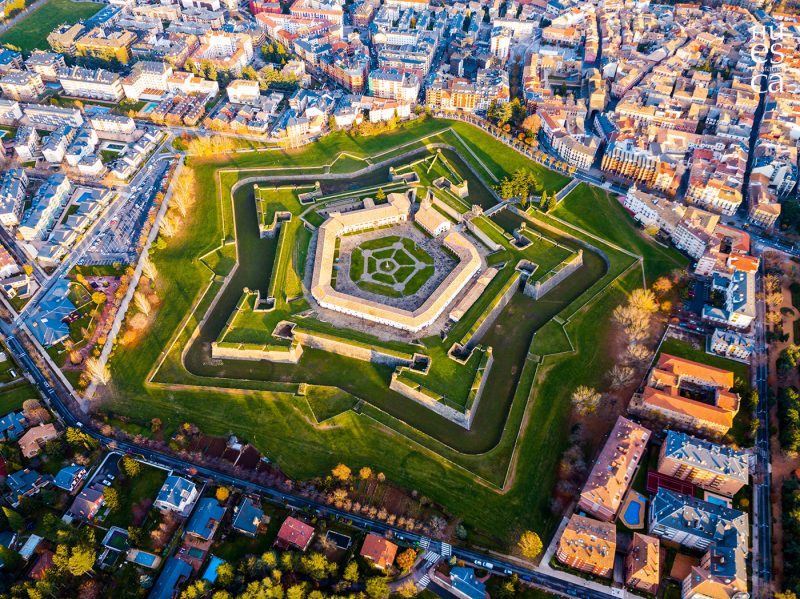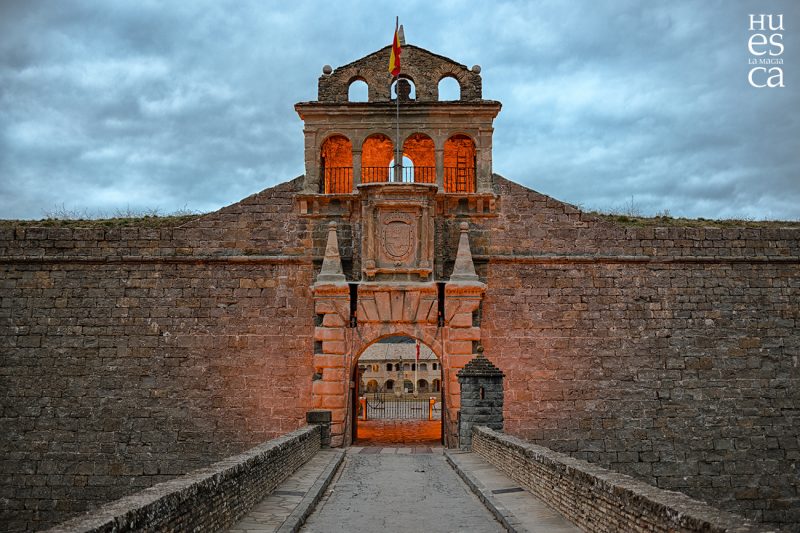Pues sí, en la provincia de Huesca tenemos nuestro propio Péntagono, pero a diferencia del de EE.UU aquí no se localiza el departamento de Defensa de España (aunque antaño tuvo una función similar) en cambio es todo un espacio dedicado a la historia de este impresionante monumento y ocio para toda la familia con actividades muy muy divertidas.
 El Castillo de San Pedro de Jaca, popularmente conocido como Ciudadela de Jaca, es una fortaleza militar construida en el siglo XVI que tiene la consideración de Bien de Interés Cultural, al amparo de lo dispuesto en la Ley 16/1985, de 25 de junio, de Patrimonio Histórico, y Decreto de 22 de abril de 1949.
El Castillo de San Pedro de Jaca, popularmente conocido como Ciudadela de Jaca, es una fortaleza militar construida en el siglo XVI que tiene la consideración de Bien de Interés Cultural, al amparo de lo dispuesto en la Ley 16/1985, de 25 de junio, de Patrimonio Histórico, y Decreto de 22 de abril de 1949.
Esta fortificación, de planta pentagonal, fue construida a finales del siglo XVI (las obras se inician en 1592). Conserva todas y cada una de sus partes características: foso, baluartes, escarpas, cuarteles, polvorines, túneles… además de una hermosa entrada a la que se accede mediante un puente levadizo.
 ¿Cómo visitar la Ciudadela?
¿Cómo visitar la Ciudadela?
Visita guiada a la Ciudadela de Jaca
Visita con guía los rincones más emblemáticos de la fortaleza de la Ciudadela de Jaca con un recorrido de unos 45 minutos de duración.
TARIFAS
General: 6 €
Reducida: 5 €
Más info >
Visita a tu aire la Ciudadela de Jaca
Visita sin guía a la Ciudadela de Jaca, las Salas de Tropas de Montaña, la sala Premios Ejército, la sala de la batalla de Waterloo y las exposiciones temporales.
TARIFAS
General: 5 €
Reducida: 4 €
Más info >
PACK DE ENTRADA (Ciudadela + Museo)
Visita la Ciudadela (con o sin guía) y el Museo de Miniaturas Militares, Salas de Tropas de Montaña y exposiciones temporales.
TARIFAS
General: 8 € sin guía / 9 € con guía
Reducida: 5 € sin guía / 6 € con guía
Más info >
Pequevisitas
Vive una aventura histórica con Pequevisitas. Visita la Ciudadela y el Museo de Miniaturas de una manera didáctica, divertida y autoguiada, a través de dos retos.
TARIFAS
General: 3€ (no incluye entrada)
Promoción con ‘Pack de Entrada‘: 2€
Más info >
La Memoria de la Piedra
Visita teatralizada a la Ciudadela de Jaca. Un espectáculo que nos remonta a finales del siglo XVI, cuando Felipe II ordenó la construcción de esta fortaleza.
TARIFAS
General: 12 €
Reducida: 10 €
Más info >
El Legado
Visita teatralizada al Museo de Miniaturas Militares de la Ciudadela de Jaca. Un apasionante viaje a través de 32.000 figuritas, desde las civilizaciones antiguas hasta la actualidad.
Actividad disponible para grupos y bajo demanda.
Más info >
Ecociudadela
Programa de educación ambiental con los ciervos de la Ciudadela, donde podrás disfrutar de la visita a ciervos de impronta humana, visita a la manada de los ciervos del foso y el visionado de un vídeo explicativo.
TARIFAS
6€. Niños a partir de un año
Más info >
Exposición clicks
Exposición temporal de muñecos de playmobil a cargo de AESCLICK, con 8 escenarios representados y más de 8.000 piezas.
Del 5 de noviembre al 16 de febrero.
La entrada incluye la visita a la exposición y al belén monumental.
TARIFAS
General: 3€
Reducida: 2€ (menores de 16 años)

